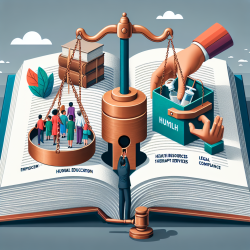Introduction
As practitioners in the field of special education and therapy services, we constantly seek ways to improve our skills and enhance the services we provide. One powerful approach to consider is the human rights framework for mobilizing resources for health, as discussed in the research paper "Health, Human Rights and Mobilization of Resources for Health" by Reidar K. Lie. This framework not only provides a moral and ethical basis for advocating for health resources but also offers practical insights into policy-making and resource allocation.
The Power of the Human Rights Framework
The human rights framework is a compelling tool for practitioners. It emphasizes the importance of viewing health as a fundamental human right, which can galvanize support and mobilize resources. By framing health issues within the context of human rights, practitioners can appeal to a broader audience, including policymakers, organizations, and the general public, to prioritize health initiatives.
Implementing the Framework in Practice
To effectively implement the human rights framework in your practice, consider the following strategies:
- Advocacy: Use the language of human rights to advocate for increased resources and support for health services. This can involve engaging with policymakers, participating in public forums, and collaborating with other organizations to raise awareness and drive change.
- Education: Educate your team and stakeholders about the importance of health as a human right. This can involve training sessions, workshops, and discussions that highlight the ethical and legal implications of the framework.
- Policy Development: Work with your organization to develop policies that align with the human rights framework. This can include creating guidelines for equitable resource allocation and ensuring that all individuals have access to necessary health services.
Challenges and Considerations
While the human rights framework offers a powerful approach, it is not without challenges. The paper by Lie points out that while the framework can guide policy, it may not always effectively mobilize resources for specific health problems. Practitioners must be prepared to navigate the complexities of resource allocation and prioritize interventions that offer the greatest benefit.
Encouraging Further Research
Practitioners are encouraged to delve deeper into the research on human rights and health resources. Understanding the nuances of the framework can enhance your ability to advocate for and implement effective health policies. Consider exploring additional literature, attending relevant conferences, and participating in webinars to stay informed about the latest developments in this area.
To read the original research paper, please follow this link: Health, human rights and mobilization of resources for health.










